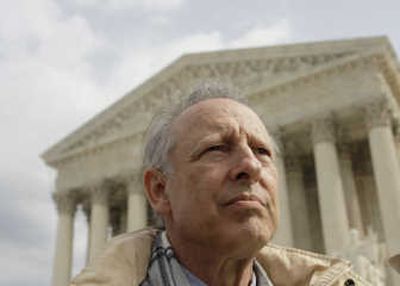Justices skeptical of D.C.’s gun limits

WASHINGTON – A majority of the Supreme Court indicated a readiness Tuesday to settle decades of constitutional debate over the meaning of the Second Amendment by declaring it provides an individual right to own a gun for self-defense.
Such a finding could doom the District of Columbia’s ban on private handgun possession, the country’s toughest gun control law, and significantly change the tone and direction of the nation’s political battles over gun control.
During oral arguments that drew spectators who had waited for days to be in the courtroom, there was far more skepticism among the justices about the constitutionality of the District of Columbia’s ban on private handgun possession than defense of it.
Justices balanced the commands of a Constitution written more than 200 years ago with the modern-day questions presented by a gun ban that, it was argued, either prevents the law-abiding from a means of self-protection or keeps more guns off the streets of the nation’s capital.
The court seemed swept up in the historic nature of its endeavor, examining a part of the Constitution that most believe has never been clearly defined. Chief Justice John Roberts encouraged the lawyers to keep talking well beyond the scheduled 75 minutes.
For all the references to Lord Blackstone and the English Bill of Rights and the framers’ intent, Roberts was succinct in describing how he might view the District’s arguments that its gun law is reasonable.
“What’s reasonable about a total ban on possession?” he asked Washington lawyer Walter Dellinger III, who represented the city.
The clauses of the Second Amendment – “A well regulated Militia, being necessary to the security of a free State, the right of the people to keep and bear Arms, shall not be infringed” – have long vexed constitutional scholars. The Supreme Court’s last major ruling on the subject, in 1939, stressed the militia-related aspects of the provision.
Roberts quickly signaled his disagreement. “If it is limited to state militias, why would they say ‘the right of the people’?” he asked.
Justice Anthony Kennedy, often the deciding vote on the divided court, was next. “In my view,” he said, “there’s a general right to bear arms quite without reference to the militia either way.”
From the District of Columbia’s point of view, deciding there is an individual right would be answering only half the question. Dellinger argued that it is reasonable for the city to ban the “uniquely dangerous” handgun, which “can be taken into schools, into buses, into government office buildings, and that is the particular danger it poses in a densely populated urban area.”
The District law, passed in 1976 shortly after residents received the right to govern themselves, also requires that rifles and shotguns kept in private homes be unloaded and disassembled or outfitted with a trigger lock.
The case heard by the court Tuesday began when Robert A. Levy, a libertarian lawyer who lives in Florida, decided to challenge D.C.’s 30-year-old ban on handguns. One plaintiff, Dick Heller, is a private security guard who wants to keep his handgun at home.
The case will be decided before the court adjourns in late June.